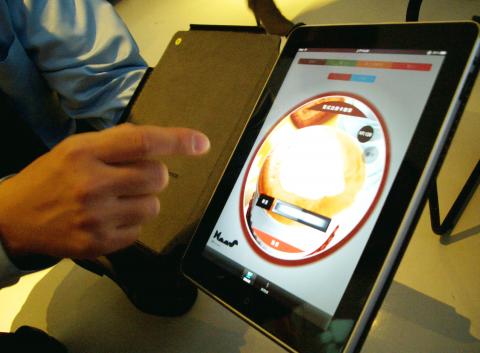XtraLab Design Co (爻域互動科技設), a Taiwan-based design company, formally opened an art gallery yesterday to showcase new interactive technology that it says will create innovative art forms and make it easier to operate businesses.
One application on display was an iPad restaurant menu in the gallery’s coffee shop, a feature XtraLab believes will bring people closer to commercial products or works of art.
XtraLab’s iPad application allows customers to preview orders with pictures or written introductions on the tablet computer.

Photo: CNA
“We hope that the iPad application will attract people to visit our gallery to experience other interactive devices that combine different fields of art,” XtraLab general manager Frankie Fan (范赫鑠) said.
Another example of the technology is a “water table” that produces virtual creations similar to traditional Chinese ink paintings. A projector creates images in water, guided by an infrared sensor that detects hand movements as people touch the water’s surface.
The company is scheduled to demonstrate the digitized art in an exhibition opening at the Taipei Fine Arts Museum on Saturday.
Another infrared technology on display at the gallery transforms a song into animation in response to gestures or movements.
“Taiwan has better opportunities in the sector because it is good at integrating technologies and talent,” Fan said. “We hope this place is not only a gallery or a coffee shop, but also a laboratory or exchange platform to explore new digital art concepts in Taiwan.”

SMART MANUFACTURING: The company aims to have its production close to the market end, but attracting investment is still a challenge, the firm’s president said Delta Electronics Inc (台達電) yesterday said its long-term global production plan would stay unchanged amid geopolitical and tariff policy uncertainties, citing its diversified global deployment. With operations in Taiwan, Thailand, China, India, Europe and the US, Delta follows a “produce at the market end” strategy and bases its production on customer demand, with major site plans unchanged, Delta president Simon Chang (張訓海) said on the sidelines of a company event yesterday. Thailand would remain Delta’s second headquarters, as stated in its first-quarter earnings conference, with its plant there adopting a full smart manufacturing system, Chang said. Thailand is the firm’s second-largest overseas

‘REMARKABLE SHOWING’: The economy likely grew 5 percent in the first half of the year, although it would likely taper off significantly, TIER economist Gordon Sun said The Taiwan Institute of Economic Research (TIER) yesterday raised Taiwan’s GDP growth forecast for this year to 3.02 percent, citing robust export-driven expansion in the first half that is likely to give way to a notable slowdown later in the year as the front-loading of global shipments fades. The revised projection marks an upward adjustment of 0.11 percentage points from April’s estimate, driven by a surge in exports and corporate inventory buildup ahead of possible US tariff hikes, TIER economist Gordon Sun (孫明德) told a news conference in Taipei. Taiwan’s economy likely grew more than 5 percent in the first six months

SUPPLY RESILIENCE: The extra expense would be worth it, as the US firm is diversifying chip sourcing to avert disruptions similar to the one during the pandemic, the CEO said Advanced Micro Devices Inc (AMD) chief executive officer Lisa Su (蘇姿丰) on Wednesday said that the chips her company gets from supplier Taiwan Semiconductor Manufacturing Co (TSMC, 台積電) would cost more when they are produced in TSMC’s Arizona facilities. Compared with similar parts from factories in Taiwan, the US chips would be “more than 5 percent, but less than 20 percent” in terms of higher costs, she said at an artificial intelligence (AI) event in Washington. AMD expects its first chips from TSMC’s Arizona facilities by the end of the year, Su said. The extra expense is worth it, because the company is

The seizure of one of the largest known mercury shipments in history, moving from mines in Mexico to illegal Amazon gold mining zones, exposes the wide use of the toxic metal in the rainforest, according to authorities. Peru’s customs agency, SUNAT, found 4 tonnes of illegal mercury in Lima’s port district of Callao, according to a report by the non-profit Environmental Investigations Agency (EIA). “This SUNAT intervention has prevented this chemical from having a serious impact on people’s health and the environment, as can be seen in several areas of the country devastated by the illegal use of mercury and illicit activities,”